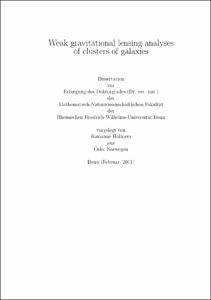Weak gravitational lensing analyses of clusters of galaxies

Weak gravitational lensing analyses of clusters of galaxies

| dc.contributor.advisor | Schneider, Peter | |
| dc.contributor.author | Holhjem, Karianne | |
| dc.date.accessioned | 2020-04-16T20:57:45Z | |
| dc.date.available | 2020-04-16T20:57:45Z | |
| dc.date.issued | 04.04.2011 | |
| dc.identifier.uri | https://hdl.handle.net/20.500.11811/4963 | |
| dc.description.abstract | Comprising the most massive gravitationally bound and relaxed structures in the Universe, galaxy clusters are essential in providing a deeper understanding of the properties of dark matter. Being cosmologically young objects, they are undergoing strong evolution from redshift ~1 until today. The cosmological evolution of clusters thus provides a direct insight into the growth of cosmic structures. Gravitational lensing is an excellent tool for studying the mass distribution in the Universe, because it does not make assumptions about the nature or the dynamical state of the gravitating matter. In particular, lensing does not discriminate between the luminous and dark matter, and is thus a unique tool for studying the latter which otherwise evades observations. This aspect is very important for an analysis of the massive structures in the Universe, since dark matter dominates their state and evolution. The topic of this PhD thesis is the analysis of galaxy clusters. Several different data sets are investigated, where cluster properties like mass, luminosity, and morphology are studied in detail, and correlations between them examined. Cluster characteristics obtained with different methods (e.g. gravitational lensing and X-ray) are compared to provide further insight into selection effects. | en |
| dc.language.iso | eng | |
| dc.rights | In Copyright | |
| dc.rights.uri | http://rightsstatements.org/vocab/InC/1.0/ | |
| dc.subject | Kosmologie | |
| dc.subject | Gravitationslinsen | |
| dc.subject | Galaxienhaufen | |
| dc.subject | Dunkle Materie | |
| dc.subject | Röntgen | |
| dc.subject | Galaxienhaufen | |
| dc.subject | cosmology | |
| dc.subject | gravitational lensing | |
| dc.subject | galaxy clusters | |
| dc.subject | dark matter | |
| dc.subject | X-ray clusters | |
| dc.subject.ddc | 520 Astronomie, Kartografie | |
| dc.title | Weak gravitational lensing analyses of clusters of galaxies | |
| dc.type | Dissertation oder Habilitation | |
| dc.publisher.name | Universitäts- und Landesbibliothek Bonn | |
| dc.publisher.location | Bonn | |
| dc.rights.accessRights | openAccess | |
| dc.identifier.urn | https://nbn-resolving.org/urn:nbn:de:hbz:5n-24783 | |
| ulbbn.pubtype | Erstveröffentlichung | |
| ulbbnediss.affiliation.name | Rheinische Friedrich-Wilhelms-Universität Bonn | |
| ulbbnediss.affiliation.location | Bonn | |
| ulbbnediss.thesis.level | Dissertation | |
| ulbbnediss.dissID | 2478 | |
| ulbbnediss.date.accepted | 20.04.2011 | |
| ulbbnediss.institute | Mathematisch-Naturwissenschaftliche Fakultät : Fachgruppe Physik/Astronomie / Argelander-Institut für Astronomie (AIfA) | |
| ulbbnediss.fakultaet | Mathematisch-Naturwissenschaftliche Fakultät | |
| dc.contributor.coReferee | Reiprich, Thomas H. |
Files in this item
This item appears in the following Collection(s)
-
E-Dissertationen (4442)




